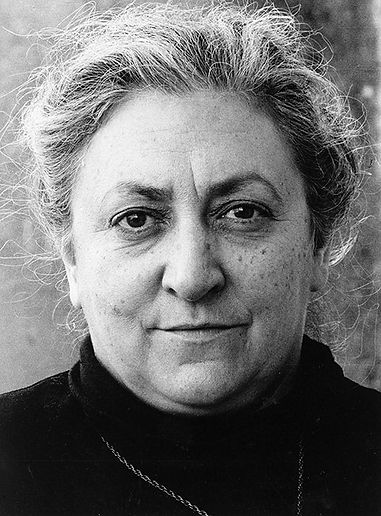Maria Aurèlia Capmany Farnés
Barcelona 1918 - 1991
Year of approval:
-
Street: 2001
-
Side street: 1992
Length:
-
Street: 738 metres
-
Side street: 55 metres
Location: South, 17003

Maria Aurèlia Capmany Farnés was a Spanish novelist, dramatist and essayist. She was also feminist, activist, cultural and opponent of Franco.
Granddaughter of the intellectual Sebastià Farnés and daughter of Aureli Capmany, folklorist and collaborator of children's magazines, she spent her youth in a family’s flat in Rambla of Barcelona. Originally her paternal family was from Rubí, but her grandfather learned to work as a basket maker and opened a basket shop in Rambla of Barcelona, where later her parents settled up and had the child.
She studied in the Generalitat School and High School and awarded a degree in Philosophy in the University of Barcelona. She worked from 1940 to 1950 in the Albèniz High School in Badalona and in Isabel de Villena School in Barcelona. She also worked engraving glass, a job that she learned during her university years.
Her first novel, Necessitem morir (“We need to die”), it was finalist at the Joanot Martorell Awards in 1947, and the following year she won with another novel. She published more stories, what took her to win the Sant Jordi Award in 1968. She also won the Ramon Fuster Awards (given by the Oficial School of Doctors and Graduates in Philosophy and Letters and Sciences of Catalonia) and the Serra d’Or Review Award of Children and Juvenile Literature.
Apart from the stories she also dedicated to translation and production of theatre works, of essays and other literary genres. In 1959 she founded the Adrià Gual Dramatic Art School. She worked as a teacher, as an actress and as a director and she performed for the first time her own works.
Really put into the fight for freedom, she participated and served against Franco, fighting for socialism and catalanism, first clandestinely and later she even worked in oficial positions. She also didn’t accept the paper that Francoism gave to women and was one of the Catalonia’s ground-breakings, through her essays, in the introduction to the modern feminism, which she was a defender. Her essays standed out for their topics about women situation and the Catalan culture and society.
She took part in the Freedom Meeting in 1972 and in the Socialist Party in the Congress of Catalonia in 1972. She was responsible for the Culture and Editions Department of the Barcelona Local Government and member of the Council of Catalonia from 1983 until he died. She was also a member of the Catalan Writers Association and the Pen Club Catalan Center president. She died from an illness and she was incinerated in the graveyard of Collserola.